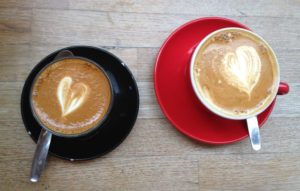Coffee Shop Culture in Australia
‘In Australia, coffee isn’t fuel for work – it’s a way of life’. Milkman (2016).
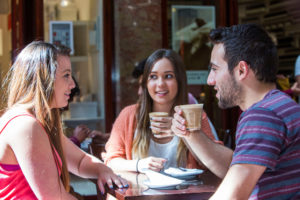
While coffee may be a global commodity, and coffee shop cultures have emerged across the world, each country tends to have its own flavour of coffee shop culture, each with their own histories, influenced by the movement of people and commodities around the globe. A particularly interesting case is Australia, described as the world’s ‘coffee capital’ by Perfect Daily Grind, which has a well-established coffee shop culture where the independent coffee shop dominates the landscape. It has been argued that Australian coffee culture has now achieved an important status representing “time out” warmth, intimacy and sophistication, with baristas representing cultural icons (Walters and Broom, 2013).
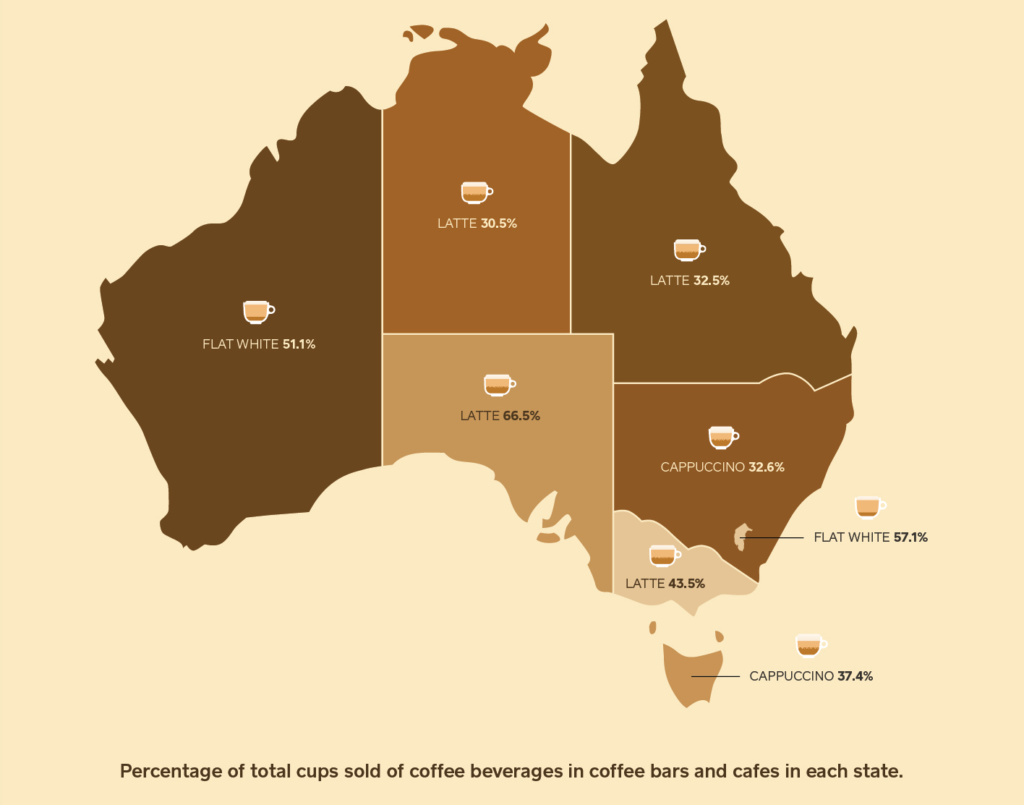
Developing an Australian Coffee Culture
The emergence of Australian coffee culture has its origins in the waves of migration from southern Europe back in the 1950s. After World War II, Italians and Greeks migrated to Melbourne in particular and with them they bought the taste for coffee, café culture, and sometimes even an espresso machine (Frost et al, 2010).
“An influx of Southern European migrants to Australia brought with them the love of coffee, and the social rituals that accompany it.” (Walters and Broom, 2013:190).

The espresso culture was adopted and transformed over time to the coffee culture that exists today, and the dominance of the family-owned independent coffee shop in Australia began at this time (Fickling, 2015). So, unlike many countries which have developed coffee cultures in tandem with the growth of global coffee shop chains, Australia owes its coffee culture to its global heritage. While espresso coffee culture established in the 1950s it was only in the 1980s when it began to expand rapidly.
“Café culture has thus become firmly entrenched in urban Australia, reflecting shifting (and at time polarized) cultural preferences and practices around space, community and the urban form” and spending time in coffee shops is now seen as a national phenomenon (Walters and Broom, 2013).
Baristas Skills
“It’s very hard to get bad coffee in Australia and, because of that, the bar’s been lifted,” (Jillian Adams, quoted in Fickling, 2015).
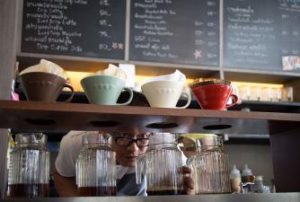
In many ways, the coffee consumed is only as good as the barista that serves it, and in Australia the role of the barista is recognised (as it is in many other countries too): “Australians expect their on-trade coffees to be made by specially-trained baristas, not just anyone pressing a button on the coffee machine” (Fickling, 2015). There is a nationally accredited academic qualification for serving espresso coffee, often part of hospitality qualifications, or commercial cookery. This is in addition to a whole host of barista training courses offered across the country, for example those from the Australian Barista School. With such importance placed on the barista role it’s not surprising that the 2015 World Barista Champion, Sasa Sestic, was from Canberra, Australia (Ona Coffee), with the first WBC from Australia being in 2003 Paul Basset (Michelman, 2015)
Dominance of the Independent Coffee Shop
The coffee shop industry in Australia unlike many other countries is not dominated by the large global coffee shop chains, but instead remains highly fragmented, with a high proportion of single store independent coffee shops – although some of the chains such as McCafé, Starbucks, and Gloria Jeans do have a presence.
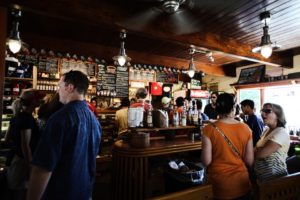
While Starbucks has been successful in many countries across the globe, Australia proved quite a challenge. It opened its first stores in 2000 and within a few years had over 80 stores nationwide, however, it had to close a large number of these as they just weren’t as successful as was hoped. There are now just 23 Starbucks coffee shops across Australia. Starbucks failed to take hold of the Australian market because independent shops already had a well-established position offering the “intimacy, personalization, and familiarity of a suburban boutique café” (Patterson, Scott and Uncles, 200: 43). Like many other coffee shops, Starbucks introduced the ‘flat white’ a drink thought to have originated from Australia (although there is some debate over whether its origins are in Australia or New Zealand). Wherever its origins, it’s an indication of how the coffee culture from this region of the world has already become global.
Specialty Coffee
“Coffee drinking is, in fact, a diehard national habit with real estate sold on its proximity to cafe strips; local baristas, roasters and an increasing number of growers have world class qualifications.” Lonely Planet (2010)
For many people, Australia is synonymous with specialty coffee, and indeed, the specialty coffee industry has seen significant developments in the last ten years, with higher quality coffee available, more independent roasters emerging and travelling to country of origins, and consumers expecting more diversity in coffee taste. As with other markets for specialty coffee the issue of traceability in the global production chains has been brought to the fore, and is something many consumers are now interested in. What is it that coffee shops in Australia are doing so well? Apart from having well trained baristas and high quality coffee, many have developed a reputation for high quality food offerings, as well as a relaxed and welcoming atmosphere. There are plenty of blog posts and webpages with tips about the best coffee shops to visit including the Top 10 Cafes for Coffee Lovers in Melbourne, from Culture Trip, a coffee shop tour of Brisbane from PerfectDailyGrind and even BuzzFeed have their own suggestions for the Australian coffee shops you need to visit. Australia is home to many independent coffee shops which are attached to roasteries too, from Ona Coffee in Canberra, to Single O in Sydney to Market Lane in Melbourne. While these roasters are well known to many in the Australian Coffee scene, there are a whole host of other roasters from those who produce enough to sell wholesale to other coffee shops, as well as micro-roasters producing enough beans to supply their own shop.
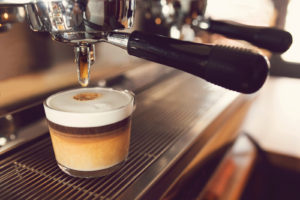
Some coffee shops even sell Australian coffee. The Australian coffee industry has been established for some time and is still very small on global terms, but with a growing reputation. Coffee farms can be found in northern Queensland and down to Coffs Harbour in New South Wales. While the climatic conditions in Australia may be different to many of the other regions around the world where coffee is grown, it has a key advantage that at present Australia doesn’t suffer from most serious coffee diseases (coffee berry borer, and coffee leaf rust) which means less pesticides are used and more natural production systems used (Clancy, 2017). With the rising importance of considering sustainability in the coffee industry, for some the appeal of using coffee beans with ‘less food miles’ is high (Pepperell, 2012).
“Australia has developed a A$4 billion ($3.2 billion) coffee-drinking market that devours more fresh beans per person than any other country. It’s also developed novel brews reproduced as far away as London and Seattle” (Fickling, 2015).
Australian coffee shop culture has reached beyond national borders, with its influences stretching across the globe. Beyond the flat white that has come to frequent so many coffee menus, Australian coffee culture is now being transferred to many other cities across the globe – in part due to baristas travelling and taking their ideas and skills with them, and partly due to growing awareness of Australian coffee shop culture. Bluestone Lane in New York City in the US, has a series of coffee shops that are modelled on the coffee culture of Melbourne, and has to compete with a range of other coffee shops which model themselves on the Australia coffee shop style with high quality coffee, food and often table service. Clearly the Australian approach to coffee, coffee shops and coffee culture, is one which not only appeals to its national audience but one which intrigues those across the globe too.

